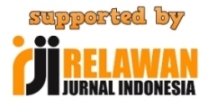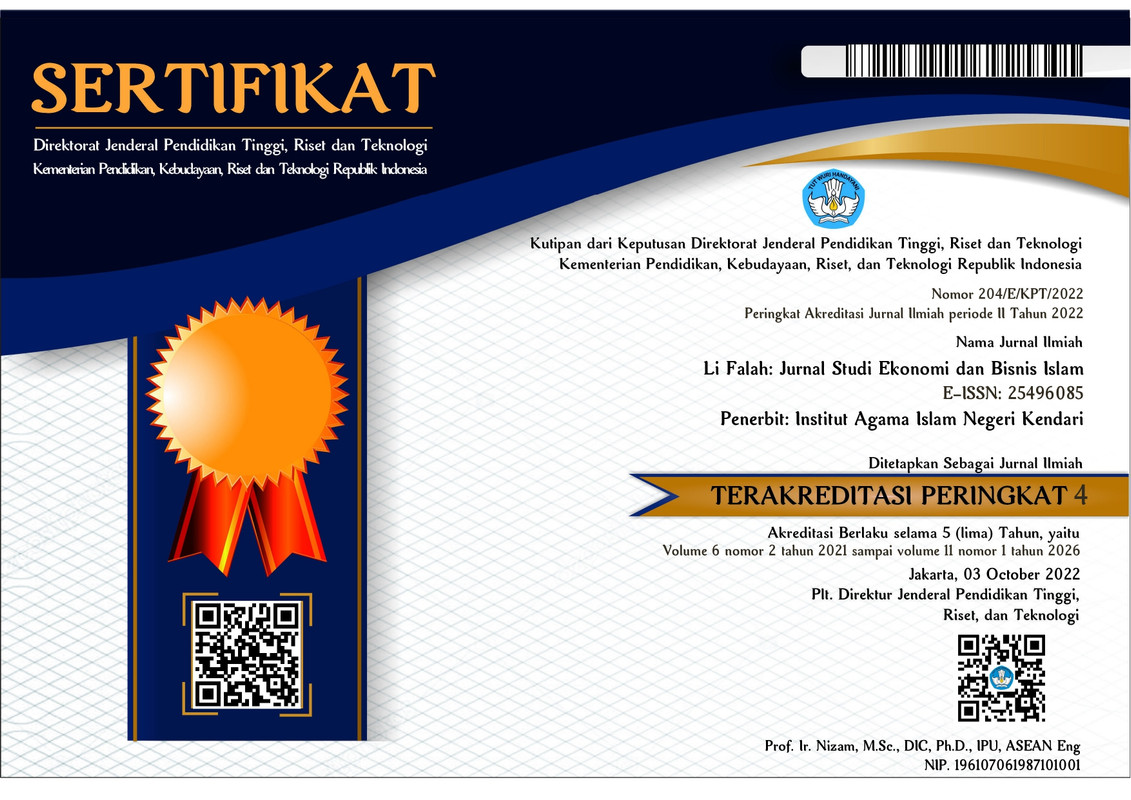Religiosity and Halal Certification: Its Effect on Interest in Buying Traditional Food
Abstract
This study aims to determine (1)—the influence of religiosity on the interest in buying traditional food of sate bandeng. (2). The effect of halal certification on the interest in buying traditional food of sate bandeng. And (3). The impact of religiosity and halal certification on interest in buying traditional food of sate bandeng. This research is the millennial consumers of traditional food of Sate Bandeng Kang Cepi Kaujon, Serang City, Banten Province. The research method used is quantitative. Methods of data collection using a questionnaire. Data were processed using SPSS version 23 software. Data analysis used the multiple linear regression method. The results of this study indicate that (1). Religiosity affects an interest in buying traditional food of Sate Bandeng. (2). Halal certification affects an interest in buying traditional food of sate bandeng (3). Religiosity and halal certification have a positive and significant impact on interest in buying traditional food of Sate Bandeng. Consumers’ interest in buying traditional food of Sate Bandeng is influenced by religiosity and halal certification as much as 48.8 percent. In comparison, the remaining 51.2 percent is influenced by other variables not examined in this study.
Keywords
Full Text:
PDFReferences
Akhyar, Kemal Faza, and Diesyana Ajeng Pramesti. 2019. “Pengaruh Religiusitas Dan Sertifikasi Halal Terhadap Keputusan Pembelian (Studi Empiris Pada Japanese Food Restaurant Di Magelang).” Jurnal Analisis Bisnis Ekonomi 13(2):617.
Alam, Syed Syah, Rohani Mohd, and Badrul Hisham. 2011. “Is Religiosity an Important Determinant on Muslim Consumer Behaviour in Malaysia.” Journal of Islamic Marketing 2(1):2011.
Anam, Samsul. 2020. “6 Jajanan Tradisional Khas Indonesia Ini Jarang Dijumpai.” Www.Brilio.Net. Retrieved (https://www.brilio.net/creator/6-jajanan-tradisional-khas-indonesia-ini-sudah-jarang-dijumpai-a491bc.html).
Andriansyah, Yusuf, Rois Arifin, and Afi Rachmat S. 2019. “Analisis Pengaruh Label Halal Terhadap Keputusan Pembelian Makanan Impor Dalam Kemasan Pada Mahasiswa Kedokteran Universitas Sumatera Utara.” Journal of Chemical Information and Modeling 53(9):1689–99.
Anggraini, Inar, and Diah Setyawati Dewanti. 2020. “The Effect of Halal Foods Awareness on Purchase Decision with Religiosity as a Moderating Variable.” Journal of Economics Research and Social Sciences 4(1). doi: 10.18196/jerss.040116.
Arikunto. 2010. Prosedur Penelitian: Suatu Pendekatan Praktik. Edisi Revi. Jakarta: Rineka Cipta.
Awan, Hayat M., Ahmad Nabeel Siddiquei, and Zeeshan Haider. 2015. “Factors Affecting Halal Purchase Intention – Evidence from Pakistan’s Halal Food Sector.” Management Research Review 38(6):640–60. doi: 10.1108/mrr-01-2014-0022.
Aziz, Yuhanis Abdul, and Nyen Vui Chok. 2013. “The Role of Halal Awareness, Halal Certification, and Marketing Components in Determining Halal Purchase Intention Among Non-Muslims in Malaysia: A Structural Equation Modeling Approach.” Journal of International Food and Agribusiness Marketing 25(1):1–23. doi: 10.1080/08974438.2013.723997.
Bachtiar, Danis Imam. 2018. “Analisis Pengaruh Diversifikasi Produk Dan Harga Terhadap Keputusan Pembelian Pada UKM Gula Kelapa.” Jurnal Ekonomi Dan Bisnis 52–60.
Basri, Yuswar Zainul, and Fitri Kurniawati. 2019. “Effect of Religiosity and Halal Awareness on Purchase Intention Moderated by Halal Certification.” KnE Social Sciences 2019:592–607. doi: 10.18502/kss.v3i26.5403.
Bungin, S. 2015. Metodologi Penelitian Sosial Dan Ekonomi. Volume 2. Jakarta: Kencana.
Burhanuddin, Nur Hasni. 2018. “Strategi Pemasaran Makanan Khas Tradisional Di Kecamatan Wotu.” Journal of Islamic Management and Bussines 1(2):20–32.
Fatemeh Shabani, Ghadikolaei. 2016. “The Effect of Halal Signs and Symptoms and Consumers’ Purchase Intention in Muslim and Non-Muslim Countries - A Review.” International Journal of Busines and Management Invention 5(7):44–49.
Ferdindand. 2002. Structural Equation Modeling Dalam Penelitian Manajemen. Edisi Revi. Semarang: Badan Penelitian Universitas Diponegoro.
Fuad Z. Iwan, SH. 2010. “Kesadaran Hukum Pengusaha Kecil Bidang Padangan Dalam Kemasan Di Kota Semarang Terhadap Regulasi Sertifikasi Produk Halal.” Universitas Diponegoro.
H, Eri Agustian. 2013. “Pengaruh Labelisasi Halal Terhadap Keputusan Pembelian Konsumen Studi Kasus Pada Produk Wall’s Conello.” Jurnal Ilmiah Manajemen Kesatuan 1(2):169–78.
Ibrahim, Hifza, and Hashanah Ismail. 2015. “A Generational Cohort Study of the Relationship between Religious Intensity and Religious Assurance for the Purchase of Non-Food Products.” International Journal of Economics and Financial Issues 5(2):330–34.
Intani T, Ria. 2014. “Kiat Penjual Makanan Tradisional Dalam Menembus Pasar.” Patanjala : Jurnal Penelitian Sejarah Dan Budaya 6(2):315. doi: 10.30959/patanjala.v6i2.202.
Jalaludin. 2010. Psikologi Agama. Jakarta: Rajawali Press.
Lestari, Ayu, Heri Praktikto, and Agus Hermawan. 2020. “The Effect Of Religiusity On The Purchase Intention Halal Cosmetics Through Attitute (Studies On Muslim Several Universities In Malang Indonesia).” Journal of Chemical Information and Modeling 22(1):203–11.
Lidiawati, Veny, and Tatik Suryani. 2020. “Understanding The Influence of Ingredients , Halal Logo and Religiosity on the Consumer Purchase Intention at Kober Mie Setan Gresik.” International Journal of Multicultural and Multireligious 294–307.
Ma’zumi, Taswiyah, and Najmudin. 2017. “Pengaruh Religiusitas Terhadap Perilaku Ekonomi Masyarakat Pasar Tradisional.” Al-Qalam: Jurnal Kajian Islam 34(2):277–300.
Momtaz, Y. A., N. Yahya, and R. Ibrahim. 2011. “Moderating Effect of Religiosity in the Relationship between Social Isolation and Psychological Well-Being.” Mental Helath, Religion, & Culture 14(2):141–56. doi: https://doi.org/10.1080/13674676.2010.497963.
Mutmainah, Lu’liyatul. 2018. “The Role of Religiosity, Halal Awareness, Halal Certification, and Food Ingredients on Purchase Intention of Halal Food.” Ihtifaz: Journal of Islamic Economics, Finance, and Banking 1(1):33. doi: 10.12928/ijiefb.v1i1.284.
Nofianti, Kholis Amalia, and Siti Nur Indah Rofiqoh. 2019. “Kesadaran Halal Dan Logo Halal: Apakah Menentukan Minat Beli? (Studi Pada Pelaku Bisnis UMKM Di Gresik).” Journal of Halal Product and Research 2(1):16–24. doi: 10.20473/jhpr.vol.2-issue.2.51-59.
Nurcahyo, Agung, and Herry Hudrasyah. 2017. “The Influence of Halal Awareness, Halal Certification, and Personal Societal Purchase Intention.” Journal of Business and Management 6(1):21–31.
Priskila, Brahmana Adiasih, and K. M. R. Rizky. 2015. “Persepsi Terhadap Makanan Tradisional Jawa Timu: Studi Awal Terhadap Mahasiswa Perguruan Tinggi Swasta Di Surabaya.” Kinerja 19(2):112–25.
Puspita, Wanda A., Sunaryo, and Risna Wijayanti. 2020. “The Effects between Religious Belief, Halal Logo, and Halal Product Knowledge on Purchase Intention Mediated by Halal Awareness (Study on Consumers Of Beverage Franchise Products In Malang).” South East Asia Journal of Contemporary Business, Economics and Law 21(5):306–19.
Rahman, Azmawani Abd, Ebrahim Asrarhaghighi, and Suhaimi Ab Rahman. 2015. “Consumers and Halal Cosmetic Products: Knowledge, Religiosity, Attitude and Intention.” Journal of Islamic Marketing 6(1):148–63. doi: 10.29244/jam.8.1.57-72.
Rakhmawati, Antin. 2018. “Pengaruh Label Halal Dan Religiusitas Terhadap Minat Beli Dan Keputusan Pembelian (Studi Pada Wardah Beauty House Surabaya).” Jurnal Sketsa Bisnis 5(1):48–59.
Sari, Fitriana Monica. 2018. “Studi: Milenial Penggila Makanan Cepat Saji, Benarkah ?” Liputan6.Com. Retrieved June 17, 2021 (https://www.liputan6.com/bisnis/read/3587046/studi-milenial-penggila-makanan-cepat-saji-benarkah).
Setyaningsih, Eka Dyah, and Sofyan Marwansyah. 2019. “The Effect of Halal Certification and Halal Awareness through Interest in Decisions on Buying Halal Food Products.” Syi`ar Iqtishadi : Journal of Islamic Economics, Finance and Banking 3(1):65. doi: 10.35448/jiec.v3i1.5515.
Suryaputri, Rossje V., and Fitri Kurniawati. 2020. “Analisis Faktor-Faktor Yang Mempengaruhi Niat Beli Produk Halal.” Taraadin 1(1):1–15.
Ulya, Ade Nurul, and Okta Karneli. 2018. “Pengaruh Diversifikasi Dan Kualitas Produk Terhadap Kepuasan Pelanggan Pada Toko Rabbani Cabang Pekanbar.” JOM FISIP 5(Edisi II Juli – Desember):1–14.
Widyanto, Hanif Adinugroho, and Muhammad Khalil Irfanur. 2019. “Faith-Based Marketing: Antecedents of Purchase Intention for Halal-Certified Personal Care Products.” Jurnal Muara Ilmu Ekonomi Dan Bisnis 3(2):421. doi: 10.24912/jmieb.v3i2.7338.
Wulandari, Sri. 2021. “Pengaruh Label Halal Dan Religiusitas Terhadap Keputusan Pembelian (Studi Kasus Konsumen Indomie Di Sidoarjo).” Jurnal Riset Manajemen Dan Bisnis Dewantara 4(1):41.
Zakaria, Z., M. D. Abdul Majid, Z. Ahmad, Z. Jusoh, and N. Z. Zakaria. 2018. “Influence of Halal Certification on Customers’ Purchase Intention.” Journal of Fundamental and Applied Sciences 9(5S):772–87. doi: 10.4314/jfas.v9i5s.55.
DOI: http://dx.doi.org/10.31332/lifalah.v6i2.2994
Copyright (c) 2022 Najmudin Najmudin, Syihabudin Syihabudin

This work is licensed under a Creative Commons Attribution-ShareAlike 4.0 International License.
Li Falah : Jurnal Studi Ekonomi dan Bisnis Islam, Indexed In
Accredited By
View My Stats
Organized by : Fakultas Ekonomi dan Bisnis Islam
Published by : Institut Agama Islam Negeri Kendari
Jl. Sultan Qaimuddin No. 17 Baruga Kota Kendari Provinsi Sulawesi Tenggara
phone. +62401-3193710
Fax. +62401-3193710
Email: [email protected]



















